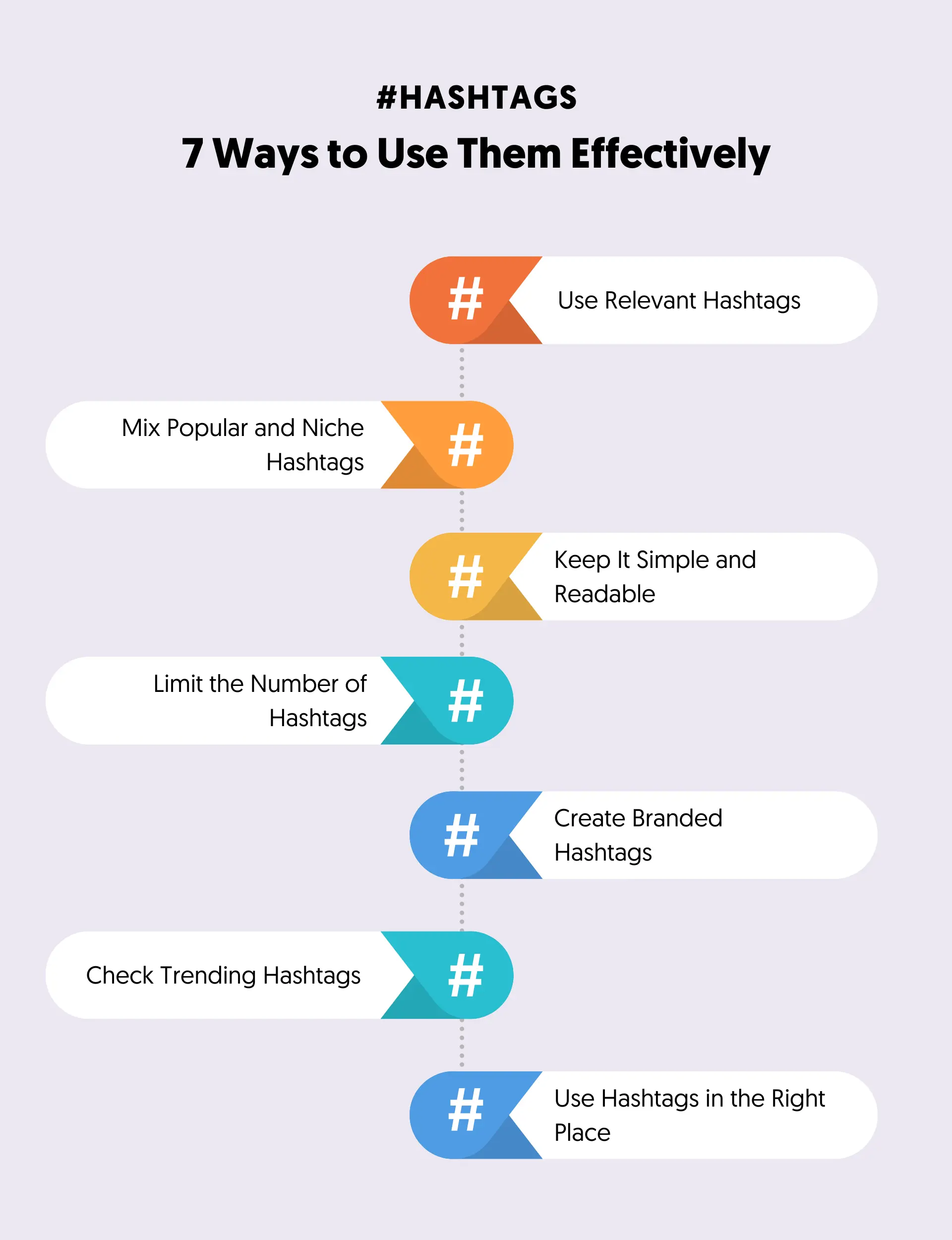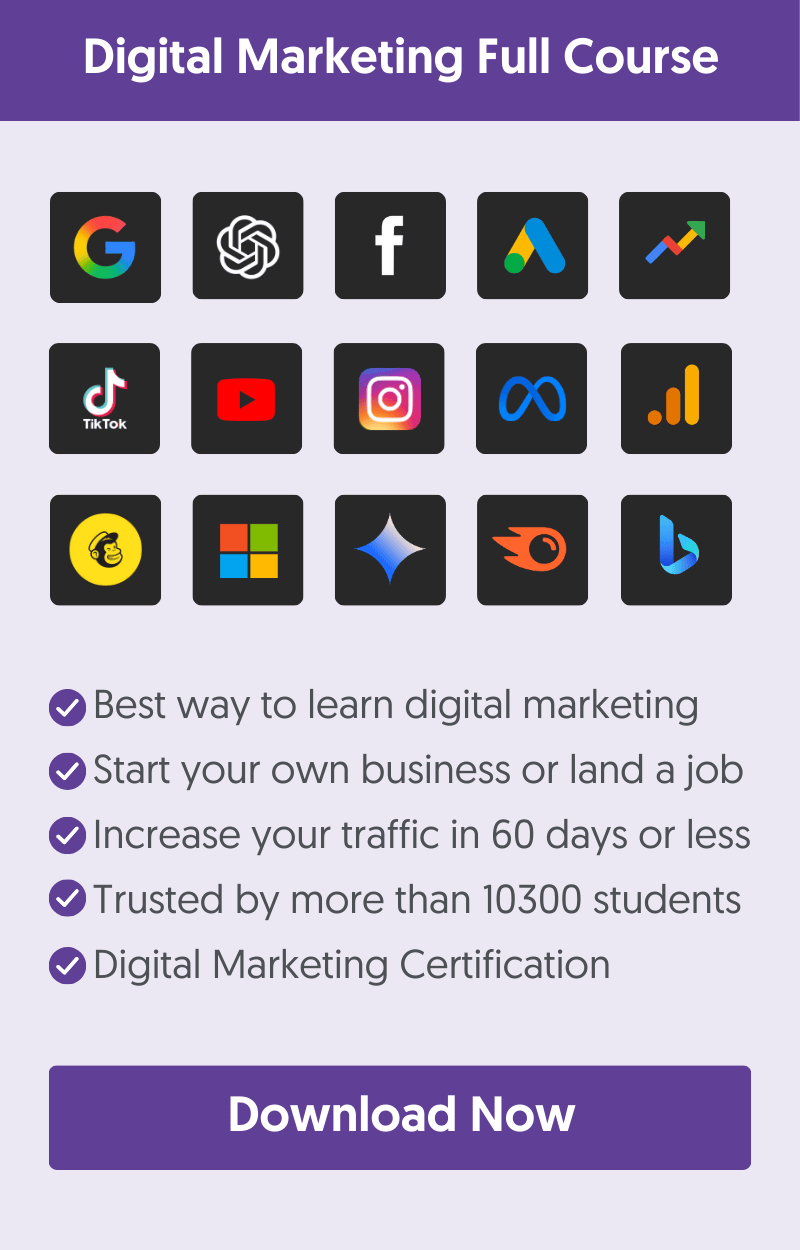- 1. Decide Which Social Media Platform(s) To Use
- 2. Optimize Your Profiles
- 3. Follow The Influencers In Your Niche
- 4. Get To Know Your Audience
- 5. Create a Content Plan
- 6. Focus on Content Quality Over Quantity
- 7. Leverage Visual Content
- 8. Post Daily, But Don't Overdo It
- 9. Use Hashtags Strategically
- 10. Follow The Rules And Be Patient
- Learn More About Social Media Marketing
Social media marketing is about building awareness for your brand, products, or services through various social media channels. It allows you to connect with your audience, share valuable content, and grow your business.
If you’re just starting out, it can feel overwhelming. With so many platforms, strategies, and content types, where do you begin? To help you get started, here are 10 essential social media marketing tips to set you on the right path.
1. Decide Which Social Media Platform(s) To Use
One of the biggest mistakes beginners make is trying to be active on every social media platform simultaneously. This often leads to frustration and burnout, with little to no results. Instead, start by focusing on one or two platforms that are best suited for your niche.
The best way to determine which platform to prioritize is by researching where your audience and industry influencers are most active. Look at key figures in your niche and analyze their presence—how many followers do they have on Facebook, Instagram, Twitter, LinkedIn, or Pinterest?
For example, if a top influencer in your industry has 100,000 Facebook followers but only 1,000 on Twitter, that’s a strong indication that Facebook is a more effective platform for reaching your target audience. By choosing the right platform from the start, you’ll maximize your efforts, engage more effectively, and grow your presence faster.
2. Optimize Your Profiles
Once you’ve chosen your social media platforms, the next step is to optimize your profiles. A well-optimized profile helps you attract followers, build trust, and establish a strong brand presence.
Here are some key steps to optimize your social media profiles effectively:
Use a Real Photo – People connect with people, not logos or random images. Use a high-quality profile picture of yourself (or a recognizable brand logo if it’s a business account). Avoid using pets, landscapes, or abstract images.
Write a Strong Bio – Your bio should quickly communicate who you are and what you do. Highlight your expertise, achievements, or what makes you unique. A compelling bio can make a great first impression.
Clarify What You Share – Let people know what kind of content they can expect from you. For example, on Twitter, you could say: “Sharing SEO tips, social media strategies, and digital marketing insights.” This helps attract the right audience.
Add a Website Link – Always include a link to your website or blog where possible. On Facebook, add it to the “About” section; on Twitter, Instagram, and Pinterest, place it in the “Website” field. This boosts traffic and supports your SEO efforts.
3. Follow The Influencers In Your Niche
One of the best ways to grow your social media presence is by following and engaging with influencers in your niche. These people already have a strong following and are seen as experts in your industry.
While they will likely not follow you back, following them is beneficial for two reasons:
It Helps Social Media Algorithms Understand Your Niche: Most social media platforms use the accounts you follow to refine their recommendations. By following influencers in your field, you’re signaling to the platform that you are also part of that niche. This increases the likelihood of being recommended to people who follow similar content, helping you gain relevant followers.
It Helps You Find Potential Followers: Influencers attract people interested in your niche, meaning their followers are likely your target audience. A common growth strategy is to follow the followers of a well-known influencer. Many of these users may check out your profile and follow you back, especially if your content is relevant and engaging.
By consistently engaging with influencers and their audience, you position yourself as an active member of your niche. Over time, this will help you build credibility, attract followers, and organically grow your social media presence.
4. Get To Know Your Audience
The key to social media success is sharing content that resonates with the right people. To do that, you need to take time to research your audience, what they care about, and how they interact on social media.
Start by identifying the type of people who would benefit from your content, products, or services. Think about their age, interests, and online behavior. Are they professionals looking for industry insights on LinkedIn? Are they young people spending time on Instagram or TikTok?
Understanding where they spend their time will help you create content they will actually engage with.
Try to analyze what kind of posts they like, share, and comment on. Pay attention to comments on your competitors' posts.
Ask questions in your posts, encourage discussions, or even run small polls to gather opinions.
When you engage with your followers meaningfully, you can create content that speaks to them, meets their needs, and encourages them to engage with you.
5. Create a Content Plan
Posting randomly on social media might seem easy initially, but soon, you'll get tired and quit.
Instead of looking for ideas every day, create a simple content plan. This doesn’t have to be formal—an Excel sheet, a Google Calendar, or even a notebook can work.
The goal is to outline what you’ll post, when you'll post it, and the type of content you’ll focus on.
Think of seasonal trends and holidays relevant to your niche and add them to your plan. Use AI tools to brainstorm new ideas and set up a posting schedule you can follow.
6. Focus on Content Quality Over Quantity
This is the foundation for having a successful social media marketing campaign. When we talk about publishing content, we always say that ‘content is king’, and this is true in social media as well.
If you share interesting and useful content, you can get more re-shares, more visitors to your website, and, under some conditions, more customers as well.
What is engaging content? From my experience (and certain studies), this is a combination of:
- Articles/Stories/Pages related to your niche but not only from your own website.
- Interesting statistics about your niche.
- Motivational Quotes related to your niche or otherwise.
- Research studies.
- Funny stuff. Whatever your niche, you can share once in a while a joke, a funny image, or a video to make your followers smile.
7. Leverage Visual Content
Social media is highly visual, and posts with images, videos, or graphics get more engagement than plain text.
People scroll quickly, and eye-catching visuals help grab their attention. Even on platforms like Twitter or LinkedIn, where text is important, adding a relevant image can significantly increase engagement.
Here are some tips to consider:
- Eye-catching, high-quality photos work best on Instagram, Facebook, and Pinterest. Avoid blurry or low-resolution images, as they can reduce credibility.
- Quick, engaging videos perform well on TikTok, Instagram Reels, and YouTube because they are easy to consume and share.
- In-depth content, such as tutorials and interviews, work great on YouTube and Facebook.
- Visually appealing charts perform well for LinkedIn, X, and Pinterest.
8. Post Daily, But Don't Overdo It
A common question from people just beginning to use social media is, “How many times should I post daily?”
The answer depends on the network.
There are many studies analyzing the effect of posting frequency, and some best practices are:
- Facebook personal page – As many times as you want
- Facebook business page – No more than 1-2 times per day and no more than 7 times per week.
- X – The more you tweet, the more exposure you get.
- Pinterest – a few times per day is enough.
9. Use Hashtags Strategically
Hashtags can make your content more searchable and help you reach a bigger audience beyond your current followers. When used correctly, they categorize your posts and make them visible to people interested in similar topics.
However, randomly adding hashtags is not a good practice. The key is to use relevant, specific hashtags that align with your content and audience.
- Start by researching which hashtags are popular in your niche.
- Look at what influencers and competitors are using,
- Mix generic and specific hashtags.
For example, if you’re in the fitness industry, #Fitness might be too general, but #HomeWorkoutTips or #StrengthTrainingForBeginners can help you attract a more targeted audience.
Use the guidelines below on how many hashtags to use per network:
- X (Twitter) 2
- Facebook 2
- Instagram 11
- Pinterest 6
- LinkedIn 3
- TikTok 5
- YouTube 2

10. Follow The Rules And Be Patient
Social media networks have rules to keep spammers away. For example, Twitter limits the number of people you can follow daily, and Facebook has its own rules.
Building thousands of followers may take time, so you need to be patient and not rush into results by breaking the rules (your account will be suspended) or spending your money on ‘buying followers or tweets’ or anything similar.
Try to spend your time creating a great social media profile that will stand the test of time, and why not become one of the authoritative profiles in your niche!



